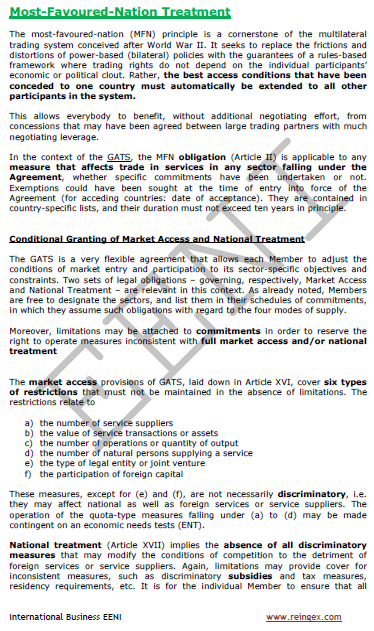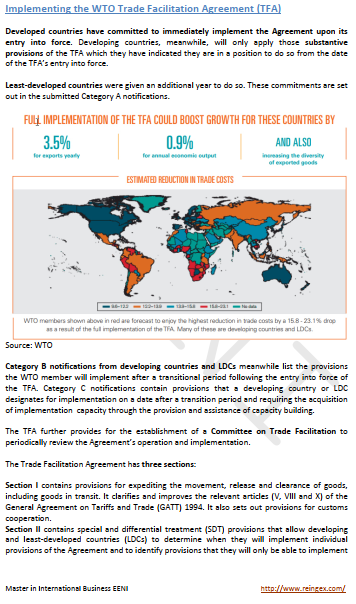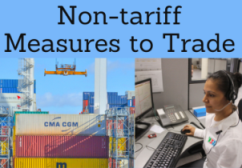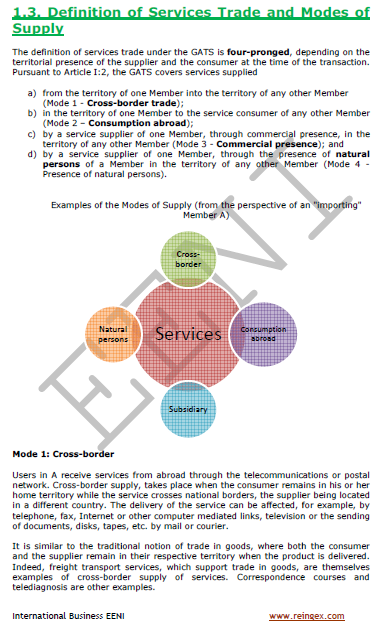World Trade Organization (WTO) Doha, Trading System
General Agreement on Trade in Services (GATS), World Trade Organization
In 1995 was founded the World Trade Organization (WTO) replacing the General Agreement on Tariffs and Trade (GATT) (Created in 1948).
- The World Trade Organization is the sole global body that regulates International Trade in Goods and Services between 164 nations
- The Main objective of WTO is to facilitate International Trade in Goods and Services between exporters and Importers
- International Trade tariff rates and open markets engagement are “bound” in WTO
- The negotiated agreements at WTO by the member countries should be ratified in their parliaments
- WTO lacks comprehensive rules on e-commerce, data flows, and digital protectionism

- Introduction to the World Trade Organization (WTO)
- From GATT to WTO
- Case Study: WTO Doha Development Round
- Doha Agenda
- Non-tariff Barriers
- Trade Facilitation
- Regionalization and WTO
- Regional Trade Agreements
- Environment and WTO
- Investments and WTO
- E-commerce
- Dispute settlement mechanism
- Trade liberalization and protectionism
- Criticisms: developing country concerns, Doha Round deadlock
- World International Trade Report
- Case Study: WTO vs. United States on Steel Tariffs
- Case Study: U.S. Tariffs on Chinese Goods (2018–Present)
- WTO Rules Summary & Case Facts
- International Trade Centre (ITC)
World Trade Organization (WTO):

- General General Agreement on Trade in Services (GATS)
- Trade Facilitation Agreement
- Agreement on Sanitary Measures
- Agreement on Technical Barriers to Trade
- Agreement on Preshipment Inspection
- Agreement on Safeguards
- Agreement on Customs Valuation
- Agreement on Rules of Origin
- Tariffs
- Agriculture
- Standards and Safety
- Textiles
- Agreement on International Trade-Related Aspects of Intellectual Property Rights (TRIPS)
- Anti-dumping

The educational aims of the Subject “World Trade Organization (WTO)” are:
- To understand the purposes of WTO
- To learn about the importance of the General Agreement on Trade in Services
- To understand the principles of the multilateral trading system
- To analyze WTO agreements (customs duties, agriculture, services, import licensing procedures) and its Implications for International Trade
- To explore customs valuation rules
- To know how to interpret the World Trade report of WTO
Sample:

The Subject “World Trade Organization” is included within the curriculum of the following academic programs at EENI Global Business School:
Masters: International Business, Foreign Trade.


Languages:  or
or  Organization mondiale du commerce (OMC)
Organization mondiale du commerce (OMC)  Organización Mundial del Comercio (OMC).
Organización Mundial del Comercio (OMC).
Area of Knowledge: Globalization.

The World Trade Organization defines the principles of Foreign Trade System:
- Without discrimination: a nation should not differentiate between its trade partners (“most-favoured-nation” or MFN status), and it should not show favoritism between national and foreign products or services (“national treatment”)
- International Trade - More free: Foreign Trade barriers should be reduced or eliminated by negotiation
- International Trade - predictable: all the actors involved in International Trade (foreign enterprises, investors, and governments) should be convinced that Foreign Trade barriers (tariffs and non-tariff barriers) should not be elevated capriciously
- International Trade - more competitive: daunting “unfair” practices (export subsidies, dumping)
- International Trade - more profitable for Less Developed Countries

The General Agreement on International Trade in Services (GATS) is the sole ensemble of regulations ruling International Trade in Services.
- Headquarters: Geneva, Switzerland
- Members: 164 countries, covering over 98% of world trade
- Key Principle: Promote free, fair, and predictable international trade
- Technical Barriers to Trade
- Non-automatic Import licensing, quotas and prohibitions
- Sanitary and Phytosanitary Measures
- Safeguards
- Preshipment Inspection
The General Agreement on International Trade in Services was negotiated at the Uruguay Round (1986-94) with the objective of regulating the immense International Trade in Services growth.
International Trade in Services stand for the fastest growing sector of the Global Economy:
- 60% of global production
- 30% of global employment
- 20% of global trade
The World Trade Organization Agreement on International Trade-Related Aspects of Intellectual Property Rights (TRIPS) was also negotiated at the Uruguay Round, introducing intellectual property regulations.
The World Trade Organization member states: Albania, Angola, Antigua and Barbuda, Argentina, Armenia, Australia, Austria, Bahrain, Bangladesh, Barbados, Belgium, Belize, Benin, Bolivia, Botswana, Brazil, Brunei, Bulgaria, Burkina Faso, Burundi, Cambodia, Cameroon, Canada, Cape Verde, Central African Republic, Chad, Chile, China, Colombia, Costa Rica, Croatia, Cuba, Cyprus, Czech Republic, Democratic Republic of the Congo, Denmark, Djibouti, Dominica, Dominican Republic, Ecuador, Egypt, El Salvador, Estonia, Eswatini, the EU, Fiji, Finland, France, Gabon, Gambia, Georgia, Germany, Ghana, Greece, Grenada, Guatemala, Guinea, Guinea-Bissau, Guyana, Haiti, Honduras, Hong Kong, Hungary, Iceland, India, Indonesia, Ireland, Israel, Italy, Ivory Coast, Jamaica, Japan, Jordan, Kazakhstan, Kenya, Kuwait, Kyrgyz Republic, Laos, Latvia, Lesotho, Liberia, Liechtenstein, Lithuania, Luxembourg, Macau, Macedonia, Madagascar, Malawi, Malaysia, Maldives, Mali, Malta, Mauritania, Mauritius, Mexico, Moldova, Mongolia, Montenegro, Morocco, Mozambique, Myanmar, Namibia, Nepal, Netherlands, New Zealand, Nicaragua, Niger, Nigeria, Norway, Oman, Pakistan, Panama, Papua New Guinea, Paraguay, Peru, Philippines, Poland, Portugal, Qatar, Republic of the Congo, Russia, Romania, Rwanda, Saint Kitts and Nevis, Saint Lucia, Saint Vincent and the Grenadines, Samoa, Saudi Arabia, Seychelles, Senegal, Sierra Leone, Singapore, Slovakia, Slovenia, Solomon Islands, South Africa, South Korea, Spain, Sri Lanka, Suriname, Sweden, Switzerland, Taiwan, Tanzania, Tajikistan, Thailand, Togo, Tonga, Trinidad and Tobago, Tunisia, Turkey, Uganda, Ukraine, UAE, UK, the United States, Uruguay, Vanuatu, Venezuela, Vietnam, Zambia, Zimbabwe.
Countries in process of accession to WTO: Afghanistan, Algeria, Andorra, Azerbaijan, Bahamas, Belarus, Bhutan, Bosnia and Herzegovina, Comoros, Curacao, Ethiopia, Equatorial Guinea, Holy See (Vatican), Iran, Iraq, Lebanon, Libya, Uzbekistan, Syria, São Tomé, Serbia, Somalia, Sudan, South Sudan, East Timor, Yemen.
Governments with observer status: Algeria, Andorra, Azerbaijan, Bahamas, Belarus, Bhutan, Bosnia and Herzegovina, Comoros, Curacao, Ethiopia, Equatorial Guinea, Iran, Iraq, Libya, Uzbekistan, Syrian Arab Republic, Lebanese Republic, Holy See, Sao Tome and Principe, Serbia, Somalia, Sudan, South Sudan, East Timor, Turkmenistan.
Non-member country: North Korea.

(c) EENI Global Business School (1995-2025)
Top of this page










 WhatsApp
WhatsApp